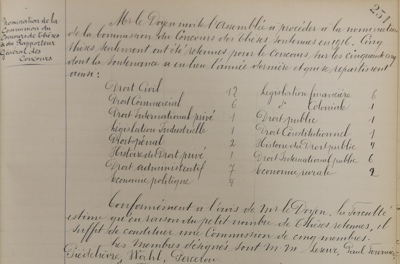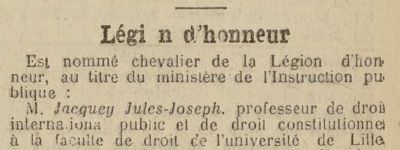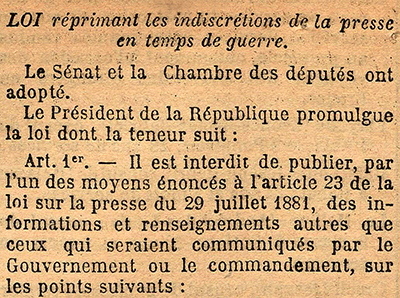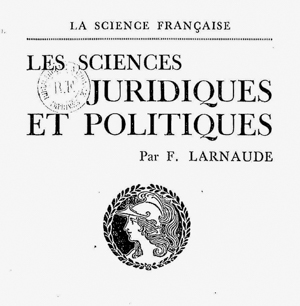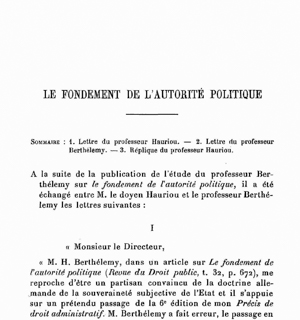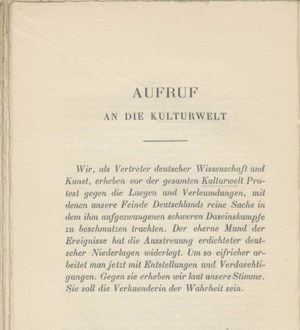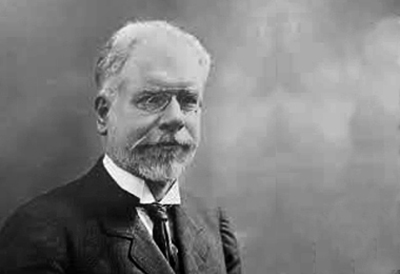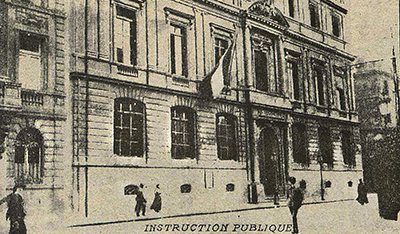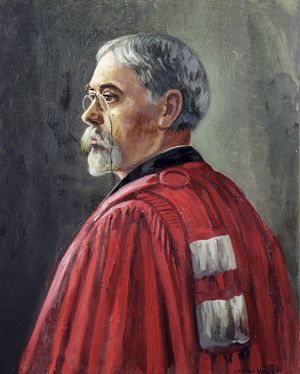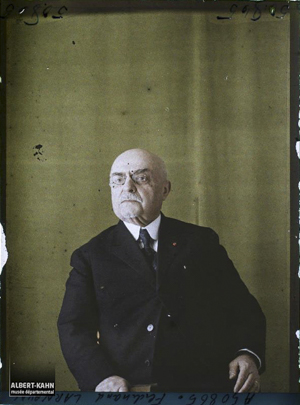The First World War was a pivotal moment for the Paris Faculty of Law. As the largest law school in France, it soon had to deal with an exceptional situation that deprived it of part of its students and professors. Under the impetus of its dean, Ferdinand Larnaude, the faculty was put at the service of France’s war against Germany, an intellectual struggle of law against force that enrolled both professors and students. War against the Paris Faculty of Law : the transformations of education The declaration of war in August 1914 surprised the faculty during the end of the examination period and upset the start of the academic year 1914-1915. Student numbers dropped throughout the war. Several teachers, of an age to be mobilized by the army,pour lire la suite…
Tag: France
Jules Jacquey (1852-1927) : Can the occupying forces be fought with the law ?
Jules Jacquey’s career was coming to an end when the war broke out, a career that had taken place exclusively in Lille since he was appointed there in 1885, the year following his success at the aggregation. This anchoring was quite rare for a native of another region, in this case Haute-Saône. No doubt we must see the effect of his marriage, celebrated in Bergues in 1885, as the bride came from a family rooted in Flanders. At the end of the summer of 1914, frightened by the rumors of barbarism peddled by the refugees from Belgium, the jurists – magistrates, lawyers and professors -, took, in large numbers, the path of exodus. In October, only four of the sixteen law school professors remained or returned to Lille :pour lire la suite…
The reflections of a Bordeaux law professor on freedom of opinion : Duguit and press censorship during the 1914-1918 war
Propaganda occupied a prominent place in the history of the Great War, because of its total and spectacular character. Even today, few textbooks address the years 1914-1918 without mentioning the word “brainwashing”, describing the unanimous and ubiquitous media tone at the beginning of the conflict, exacerbating heroism and national assets while demonizing – even ridiculing – the German enemy. The main challenge was then to convince citizens of the correctness and the merits of the war. Censorship, a negative and complementary aspect of propaganda, was an equally total institution. Total, because the control it exercised extended to all political actors (members of the government, political parties), to all written production (press and publishing) as well as live performances (theater, songs). If the First World War contributed topour lire la suite…
Legal propaganda in the Great War : the example of Ferdinand Larnaude’s Sciences juridiques et politiques [Legal and Political Sciences] (1915)
In 1915, the World’s Fair left the Old Continent for the United States ; this was not a first, since Philadelphia, Chicago and St. Louis had already hosted this event before. Recovering from the terrible earthquake of 1906, the city of San Francisco was this time chosen to receive the exhibitors of the twenty-four participating countries ; between March and December 1915, it would welcome about nineteen million visitors. The event, as always, revolved around a major theme. For this iteration, it was the Panama Canal, completed and inaugurated a year earlier, that was in the spotlight : the exhibition was renamed “Panama- Pacific” for the occasion. Indeed, this canal, whose titanic work began in 1882, allowed an unprecedented expansion of maritime trade and contributed to the strongpour lire la suite…
The uses of war in public law controversy
The doctrinal positions of lawyers were directly impacted by the conflict. A double re-reading of legal thought was carried out : because of the war, by the rediscovery and the highlighting of the radical opposition of the French and German doctrine of law and the state, but also in relation to the war, according to an enterprise of labeling and denial of certain theoretical commitments that could be demonized from their supposed kinship with the doctrine on the other side of the Rhine. In this case, the divisions were reinterpreted using the passions and affects generated by the conflict. If, under the first aspect, the legal doctrine was therefore clearly instrumentalized in the service of the victory of the nation, under the second, it was onpour lire la suite…
The Paris Faculty of Law denounces the violation of the law of nations by Germany
From the beginning of the Great War, the professors of the Paris Faculty of Law denounced the “violation de tous les principes [violation of all the principles]” of the law of nations by the Germans, in particular the attack on the neutrality of Belgium which was guaranteed by treaties to which Prussia had subscribed. Didn’t Chancellor Bethmann-Hollweg, “descendant d’un des professeurs de droit les plus connus de l’Allemagne [descendant of one of Germany’s best-known law professors]” (Moritz Bethmann-Hollweg, one of Savigny’s students) say that “les traités ne sont que des chiffons de papier [treaties are nothing but scraps of paper]” ? This “parole impie [unholy word]” was recalled by Dean Larnaude in his speech to his colleagues on 7 November 1914 on the eve of thepour lire la suite…
Léon Duguit, German science and the Great War
Pierre Marie Nicolas Léon Duguit was born on February 4, 1859 in Libourne, Gironde. Brilliant studies, both in high school and university, allowed him to obtain the title of doctor at twenty-two years old. Thanks to an age exemption, he was granted tenure the following year. He taught the legal history in Caen, before returning to Bordeaux in November 1886. There, he met sociologist Émile Durkheim, who strongly influenced his legal thinking, tinging it with legal sociology. In parallel with his teaching, Duguit became involved in politics. He claimed to belong to the Léon Bourgeois’s “solidierist” current, represented in Bordeaux by Durkheim. According to Duguit, a jurist has a social role, that of “guide” towards the legislator, because of his discoveries of social laws. Inpour lire la suite…
The perception of German science at the University of Bordeaux during the Great War
On December 8, 1870, Bordeaux, a provincial city far from the fighting between France and the German powers, welcomed the government delegation within its walls for two months. Its distance from the front was an asset, on top of its good relations with England, which allowed it to procure equipment necessary for the war effort. It was during this period that the faculty of law of Bordeaux – “completely forgotten” by the Napoleonic Imperial University – opened its premises again after almost a century of total emptiness, from 1792 to 1870, and this, despite the repeated request of the Bordeaux Bar to obtain its reopening. But it did not really assume its functions until mid-1871, long after the government had left. The war of 1870pour lire la suite…
Dean Maurice Hauriou’s speeches (1914-1919)
On Saturday, July 18, 1914, twenty days after the assassination of Archduke Franz Ferdinand, the academic year ended at the Toulouse Faculty of Law. In the middle of the afternoon, the faculty board was presided by Dean Maurice Hauriou (1856-1929). Over thirty minutes, they debated the candidacies for the vacant chair of Roman law as well as the distribution of the proceeds of the optional lectures. The faculty assembly then met to award the prizes of the end-of-year exams, the regulation of free courses and the Maurice Garrigou Foundation. Students and teachers were still able to enjoy a few peaceful days before being swept away by the turmoil of war. On Wednesday, November 25, 1914, the European conflict became a part of the debates of the organs of thepour lire la suite…
Dean Larnaude’s speeches
In its 1900 issue, the Revue internationale de l’enseignement [International Review of Education](IRE) transcribed a speech delivered by Dean Ernest Glasson (1899-1906 deanship) on the occasion of the presentation of the prizes of the Faculty of Law. The statement on the development of teaching in the Paris Faculty of Law in the nineteenth century concludes with the prospects of a hoped-for future for the institution : ” Que notre chère École continue sans interruption sa marche progressive, et que pendant ce vingtième siècle qui sera peut-être une époque de luttes formidables, elle reste, par la fermeté inébranlable de ses doctrines, un des représentants de la science les plus autorisés du Droit contre les abus de la force. Que la France remplisse sa mission en s’inspirant de l’esprit moderne, sanspour lire la suite…

